AAPS Mulls Goals of Rising Scholar Program
Ann Arbor Public Schools Board of Education regular meeting (Feb. 13, 2013): A highlight of the meeting was a presentation to the board on the Rising Scholars Program.
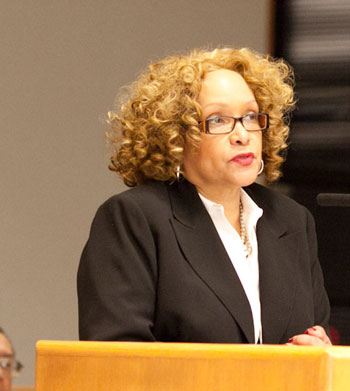
Robyne Thompson, assistant superintendent for secondary education, gave the board a report on Rising Scholars, meant to provide support for high-achieving but underserved students. (Photos by the writer.)
The program is meant to provide support for high-achieving but underserved students. It’s a part of the district’s strategy for addressing the achievement gap between different ethnic groups. The presentation prompted some discussion about the overall goals of the program and the inequitable resources across the three comprehensive high schools. Several trustees expressed their frustration that not much had changed in the past two years.
The board was also presented with three purchase requests – two requests for purchases for new iMacs and new MacBooks for a total of $2,431,700. The computers would be paid for out of the technology bond. If the board approves the purchases, there are additional costs associated with the new computers. New software would also need to be purchased, and the cost of which would come out of the general fund. The third purchase request was for a new artificial turf field at Skyline for a cost of $858,056. The turf would be paid for out of the sinking fund.
Thirteen students, parents, and staff were present during public commentary to speak in favor of maintaining the trimester system at Skyline High School. This came in response to a request trustee made by Christine Stead at a recent meeting to hear from the members of the school community who favored trimesters. The board has in the past heard complaints about the trimester approach and calls for Skyline to adopt semesters, which is the scheduling approach used by Ann Arbor’s other two comprehensive high schools.
Also at this meeting, state representative Adam Zemke was on hand to talk about the impact Governor Snyder’s proposed budget would have on the district. He also heard the concerns of the board regarding changes in legislation.
Rising Scholars Program: Overview
Superintendent Patricia Green introduced the report on the Rising Scholars (RS) program by saying they had wanted to establish a good review of the program, along with some basic archival information. She said that when Robyne Thompson, assistant superintendent for secondary education and career and technical education, was hired on in July of 2012, one of the first conversations Green had with her was about the RS program. Thompson has since then spent time going through files and “beating on doors” to get some of the basic information about the program.
The program began in the 2008-2009 school year. It was a partnership formed with the AAPS Partners for Excellence and the University of Michigan’s Center for Educational Outreach (CEO). According to the CEO website, the RS program is a partnership between the CEO and AAPS, which is designed to reach out to the underserved but high achieving students to decrease the documented achievement gap and prepare them for college. Beginning in ninth grade, a cohort of students from Ann Arbor high schools participate in a summer bridge program that includes academic preparation, leadership development, and team building activities. William Collins, CEO executive director, commended the AAPS board for acknowledging the achievement gap and trying to do something about it.
Thompson gave an overview of the program timeline, which included a breakdown of the staffing for the program. While Pioneer High School has had a dedicated 1.0 FTE (full time equivalent) position for RS for the since the program’s inception, Huron and Skyline high schools have not. For the most recent school year, RS coordinator Dawn Richberg has a 1.0 FTE at Pioneer. Coordinator Allen Porter splits his time as a .75 FTE RS and .25 FTE English teacher at Skyline. And at Huron, Brandon Jackson has a .5 FTE RS appointment and a .5 FTE to teach history at Community High. Thompson noted that the staffing falls under the discretion of the building administrators.
Thompson also presented the statistics on the program, which included enrollment in the program, Advanced Placement (AP) course enrollment, and performance on ACT scores. Total enrollment currently (with the number of students enrolled in at least one AP class in parens) is: 100 (45) Huron; 97 (41) Skyline; and 58 (19) at Pioneer. The aggregate average ACT score for all African American students is 17. But for Rising Scholar African American students, the score is between 22 and 23.
Some problems in the program were highlighted by Thompson, including the fragmentation of communication between AAPS and COE in spring 2011, and the fragmentation of effort among the three comprehensive high schools. Overall, though, she said it was a wonderful program that needed to have its process tightened up and its resources redistributed.
Rising Scholars Program: Inequitable Resources
The trustees thanked Thompson for what trustee Andy Thomas called a “comprehensive and thorough” report. Trustee Glenn Nelson applauded an “orderly description of what has occurred and a plan for the future.” Stead said she had more confidence in what’s going to happen with the program based on Thompson’s report. Many of the trustees, however, expressed frustration about the condition of the program, especially given the disparity in resources across the high schools.
Thomas said he was frustrated at the lack of movement that has taken place in addressing some of the challenges Thompson noted. When the performance committee addressed this issue over two years ago, the same problems were brought up then. Parents and other people associated with the program saw that there were different emphases at each high school and that staffing decisions were made in a “siloed” manner, rather than an across-the-board allocation. Resources were not spread equitably across the district – in light of the fact that Pioneer has a dedicated 1.0 FTE RS position, but fewer students enrolled in the program than the other two comprehensive high schools. Those greater resources have not translated to greater success. Thomas said that although the board didn’t want to micromanage the program, he struggled with the fact that things have not changed for the better.
Nelson echoed the remarks from Thomas, saying that the board did not want to micromanage the program. He did question, though, how often it happens that the board says something is a priority, and the “people in the trenches” determine that it does not need to be a priority, and disregard board direction. He said that maybe trustees were making a mistake in talking about RS – because they don’t talk about the English or physics departments in the same way.
Stead said that when it seems that board directives have been ignored, she begins to think the Educational Achievement Authority (EAA) is a good idea. While there has to be a balance of allowing administrators to do some thinking and exercise some judgement and the board’s decisions, the communication back to the board needs to be in place. If it is missing, then the board needs to exert control. She said the board is going to continue to ask its administrative leaders to be creative as they embark on an enormous budget reduction, but communication will be a key factor.
At the May 10, 2011 performance committee meeting, the trustees recommended that: (1) the resources used in the RS program in 2011-12 should be equal to those used in 2010-11. The board decision not to make cuts in the program even as most other programs were cut reflects the importance trustees place on the goals and objectives of the program; and (2) the personnel and other resources should be realigned to ensure a human presence at each of Huron, Pioneer, and Skyline.
To shed some light on the discrepancy between board directive and actual staffing decisions, Green said said that in 2011, staffing sheets were completed in March and April, but the board directive came a month later, in May. She felt that board direction was not communicated to the school level, and that gaps in program leadership had emerged as people entered and left the program. Moving forward, however, Thompson and Dawn Linden, assistant superintendent for elementary education, clearly understand their responsibilities to communicate any board directives about the program to the building principals. Green called the program a “gem” and said if the board wants an FTE at each school, then there will be one.
Thompson assured the trustees that systems and processes are now in place so there will not be the same problems going forward. They have plans to make sure the program is not fragmented from building to building and will work to educate people on what the program is about. Green also told the board that the executive cabinet meets every Thursday to review the board meeting to make sure they know what each person needs to do to move forward. At each meeting, they review the previous meeting to make sure “the loop was closed.”
Trustee Susan Baskett said she was “beyond frustrated.” She did not accept the idea that the building administrators didn’t know the board of trustees supported allocating resources – as she and trustee Simone Lightfoot had both sent emails. She asked how it was that Huron had the lowest FTE allocation, but the most students. At Huron, she noted, the commitment to the program and the performance was strong.
Baskett also asked about the credentials of the recently-hired Pioneer program supervisor, Dawn Richberg. Baskett indicated that it seemed to her that for Pioneer’s program, whoever got the ball tossed to them was asked to supervise the program. Thompson responded to Baskett by saying that Richberg was hired after several candidates were interviewed, because it was felt she was the best person for the job.
Thompson also acknowledged the frustration felt by Pioneer students, as leadership at the supervisor level has changed considerably over the years. This has led to 11th and 12th graders opting out of the program. Richberg is working to focus on ninth-graders being vested in the program and working to build trust with the students, Thompson said.
Rising Scholars: Overall Goal of Program
Trustees engaged in some discussion about the overall goal of the program. Was the program to help students who just needed some support and resources, or was it for students who would fall through the cracks otherwise?
Baskett said she was nervous about a proposed selection criteria change to the Rising Scholars program, which increases the minimum Lexile reader score for students from 900 to 1,000. [On the Lexile reader scale, a score of around 1600 would characterize an advanced reader.] Setting eligibility at a higher score seemed to Baskett like it made Rising Scholars a program for students who would succeed on their own, not for the kids who would fall through the cracks. It sounds to her like taking the “talented tenth” and giving them more resources. Lightfoot said she, too, was concerned about the change in Lexile score for acceptance into the program. She’s “seen rigor beat children down” unless they have the support to lift them back up. She asked for the basis of the change.
Thompson said that they had found that students in the 900 range sometimes struggled in classes that demand deep reading and comprehension. For example, she said, “You’re not going to put a poor reader in an AP history class.” She also acknowledged that there were some students in the program who would have been fine without RS. The district will be working to reach out to students who may not “self-select,” by explaining to middle school teachers and counselors the kinds of students they are looking for. The district is also building a website so parents have a better understanding of the expectations of the program.
Nelson said that he thought RS originated from a desire to address the problem of top students who were economically disadvantaged. These were the students who were graduating, going to school, not getting into trouble, but who were not achieving their potential. Nelson was “quite apprehensive” to make RS into a program that solves a different problem – of the student who is not going to make it out of high school without it.
Lightfoot responded by saying that she feels such desperation when looking at the abysmal numbers for many students of color. The RS program was “one of the only things they have,” and she feels a desperation to help all of the district’s students. Lightfoot contended that the district did not have a program in place commensurate with RS to assist the students who fall through the cracks. There was “mighty work to do” to make improvement for those students.
Nelson responded to Lightfoot by saying that it was “just not correct” that the district is not doing anything for the other kids. The district has a “two-inch thick document,” [a reference to the Achievement Gap Elimination Plan] on outcomes and programs to improve student achievement, Nelson said.
President Deb Mexicotte reiterated Nelson’s recollection of the initial goals of the program, saying that the program was designed for those students who could do AP and Accelerated Course (AC) work, but for some reason did not – due to lack of mentoring, lack of encouragement, or another reason. They wanted to eliminate those reasons so that band of students could achieve. She said that in a program such as RS, a range of student abilities should not just be expected but be encouraged, so that some students can uplift others.
Rising Scholars: Next Steps
Lightfoot said that because the district now has solid leadership at the top level of the RS program, she wanted to know more about the next steps. She asked if there were plans for a more uniform program across the district.
Thompson said she was working to create a common syllabus, as well as a common recruitment process, to be used by all of the schools.
Baskett ventured that the district was making the job easier for William Collins, at University of Michigan’s Center for Educational Outreach. So Baskett asked what resources Collins was bringing to the table. Collins responded by saying UM has provided mentors and tutors for the program. They pay for students to lead tours during the summer. And during the summer bridge program, the CEO has faculty open up their labs and classrooms to students. Collins also pointed out that the center’s work is general education outreach. Their goal is to encourage students to do well when they’re in school and to take a rigorous academic schedule. If they do that, he said, they’ll be competitive for all schools.
Outcome: This was an informational presentation. No board action was required.
Adam Zemke on Governor Snyder’s Budget
Adam Zemke, a Democrat who represents the 55th District in Michigan’s house of representatives, spoke to the board about Governor Snyder’s recent budget proposal.
The 55th District includes the northern part of the city of Ann Arbor, a portion of the city of Milan, and the townships of Ann Arbor, Augusta, Pittsfield, and York. Zemke serves on the house appropriations committee. In that capacity, he is a member of the department of education subcommittee; and he’s the Democratic vice chair of the joint capital outlay and community colleges subcommittees.
Zemke gave a brief overview of some of the highlights of Governor Snyder’s proposed budget. In that budget, there would be a 2% increase to K-12 education. Much of that increase would go toward Michigan Public School Employees’ Retirement System (MPSERS) funding. After that, “the rest is uncertain.” He noted the governor was trying to have the budget sealed by June 1. He said he will be back in front of the board as often as he can.
Zemke: Reactions from the Board
The trustees thanked Zemke for being an advocate for education and for appearing before the board. Baskett noted that Zemke has been very visible in the community. When he’s not available, she said, his staff is. She urged others to give him their feedback.
Thomas clarified that the only adjustments to foundation allowance amounts would be for districts that are receiving the minimum amount. AAPS would not see an increase. Zemke said that was his understanding, as well.
Trustee Irene Patalan asked for clarification of how the state was using money earmarked for K-12 education. She said her understanding was that there was a general fund the state uses to pay its bills, and there was a separate school aid fund. As the general fund coffers are being depleted, the state has drawn from the school aid fund to pay its bills. She asked if conversations were taking place about changing the way schools were funded – because the current way is untenable.
Zemke said the removal of funds from the school aid fund began in 2009, with a larger portion being taken in the 2010-2011 budget cycle. In the 2013-2014 budget, he said there was a doubling of funding for early childhood education, of which 15% will come from the K-12 school aid fund. While the intent of Proposal A was not for the school aid fund to be used in this way, he said, loopholes allow for it.
Stead asked if Snyder was aware that in Ann Arbor, the community where he resides, the district was making do with the same foundation allowance it had in fiscal year 2001. Foundation allowances have not kept up with inflation rates, and two years ago, $470 per student was cut by the state, she said. And 20J districts like AAPS have had their funding cut – to fund the rest of the state’s districts. [20J districts are those districts that had the highest per-pupil revenue when Proposal A was passed in FY 1994]. In addition, districts must contribute 27.43% to MPSERS, which means they have had to spend much less on teachers and students to offset the increased costs of retirement funding. Stead contended that these expenses were only applicable to traditional public schools, not charter schools. She maintained that a lot of talk about “choice” and education reform would be heard from the Snyder administration, and encouraged people to pay attention to what that means, and to ask if it meant better choice. Over 300 bills related to K-12 education have been passed since Snyder took office, and most of them have had to do with funding and mandates, she said.
Referring to the Oxford Association’s rewrite of the School Aid Act of 1979, Stead said that as legislation is being introduced to change school funding, no consideration has been given to the differences in location or educational needs of the students when parsing out the funds. She emphasized that even though taxpayers in the Ann Arbor school district pay 6 mills of property tax, 80% of that does not come back to Ann Arbor. When citizens agreed to Proposal A, she maintained, they agreed to equity – but did not agree to well over 50% of their money going to other districts across the state. Stead said that number will only continue to escalate, and what comes back into the district will only continue to get smaller. As the state tries to move from a traditional manufacturing base to a more tech-based economy, she argued, a funding model is needed that is equitable but needs-based.
The trustees also presented Zemke with several of the issues they would like to addressed at the state level. Nelson asked if there was any movement towards giving districts more flexibility in using their sinking fund for things beyond capital expenditures. Zemke told Nelson that he has introduced a piece of legislation to address exactly that issue, and the bill is that is moving through the cosponsor process. While other bills have tried to address the issue before, Zemke believes his is different, because it’s more narrowly focussed. He said the sinking fund legislation is in motion on both sides of the aisle in Lansing.
Thomas asked Zemke to work on legislation to address funding of transportation for school districts. One of the solutions many members of the public bring up, Thomas said, is to charge a fee to those who use transportation service, with a sliding scale for low-income students. Thomas said he likes the idea, but under Michigan law, the district is either required to provide transportation to all students or not at all – but the district cannot charge for transportation.
Lightfoot echoed Thomas’s sentiments about transportation, urging Zemke to include the district in the conversation. She noted that they have done fresh research around the matter and could provide valuable insight. Zemke said he intends to have all local bodies involved, as they are the experts.
Mexicotte noted they have watched “with horror and alarm” at the changes that have been happening at the state level. She appreciated that Zemke has taken up education as an issue and said she hoped they could partner with him.
Purchases: Technology
The trustees were briefed on two purchase recommendations for Apple computers. The first recommendation was to appropriate $1,974,100 to purchase 1,900 iMac 21-inch desktop computers to replace the eMac computers currently in use in computer labs district-wide. The eMacs are seven to eight years old. The new computers will be used for Northwest Evaluation Association (NWEA) testing next fall, according to Randy Trent, executive director of physical properties.
Because the computers will be using Mountain Lion, the newest version of the Mac Operating System (OS), there are some cost implications for software. Some of the software the district owns will not be supported by the OS. Trent said there will be costs of $262,000 for new software, $33,000 for Microsoft Office, and $92,000 for ongoing costs.
While the computers themselves will be paid for with money from the technology bond passed in May 2012, Stead clarified that the additional software costs will have to come out of the general fund – because they are instructional costs, not hardware costs. Green noted that the additional costs were not part of the current budget and would have to be built into it. She said she felt it was important to share that information so the trustees would be able to make an informed decision.
The second recommendation was to purchase 400 MacBook Pro 13-inch laptops to replace the older laptops in one computer cart at each elementary school at a cost of $457,600. The older computer cart laptops will then be used to replace other failing laptops.
Apple, Inc. had initially offered the standard 7% educational discount plus 13%. On Feb. 11, the company approved a larger discount to AAPS, which translates to an amount between 15 and 25% off the list price. The discount was given because the district was interested in purchasing older model iMacs, as opposed to the newest model. The company was also more willing to work with the district to bundle the purchases together to offer more favorable discounts.
Outcome: This was a first briefing. The board will vote on the purchase after a second briefing at the next regular meeting.
Purchases: Skyline Turf Field
Trent also presented a recommendation to the board to award a contract to AstroTurf in the amount of $858,056 for a synthetic turf field at Skyline. While Huron and Pioneer both have two artificial grass fields, Skyline only has one. Trent said they were looking to make the Skyline field more playable. An artificial turf can be played on all of the time, and it doesn’t get worn down like grass.
AstroTurf was the lowest bidder out of the four bids received. AstroTurf was recommended not only because it was the lowest bidder, but also because it is the only field that has an antimicrobial product applied at the factory as a standard. The district would not need to apply an antimicrobial every year, as with other field surfaces.
Because this was a large purchase with a high profile, Trent brought it to the board, to make sure trustees were aware of the purchase. Green asked that the district put up a sign that indicates the money was not coming from the general fund – as the district had done the Pioneer High School fieldhouse was built in 2011.
Nelson also wanted to emphasize that the money for this turf purchase was from the sinking fund. Ann Arbor district citizens have been “very good to us in giving us sinking funds so we can have excellent facilities,” he said. However, he noted, they cannot move money from the sinking fund to the general fund. Sinking fund monies are legally separated from the district’s general fund, meaning the money the district spends on construction projects cannot be spent on educational resources or personnel.
Outcome: This was a first briefing. The board will vote on the purchase after a second briefing at the next regular meeting.
Purchases: Sound Systems
The board unanimously voted to approve the purchase of 35 mobile sound field amplification systems through REMC, a regional purchasing consortium, for a cost of $27,405. The new equipment will replace systems purchased as part of the 2004 Comprehensive School Improvement Program (CSIP), which are now failing to maintain their battery charges. Trent noted that the mobile units can be used throughout school buildings, in media centers, and in gyms.
Outcome: The board approved the purchase without any discussion after having been initially briefed on the sound systems at its Dec. 19, 2012 meeting.
Skyline Trimesters
Thirteen members of the public spoke in favor of maintaining the trimester scheduling at Skyline High School. The administration is currently looking at the possibility of changing Skyline from trimesters to semesters. Stead had recently asked at a board meeting to hear from people in the community who support trimesters – because the board had previously heard from only people who opposed the scheduling. [For example, the board's Dec. 12, 2012 committee-of-the-whole meeting featured public commentary from four parents opposed to the trimester system.]
Emilie Weisberg, a Skyline junior, argued that the only way to move forward for Skyline was to keep the trimester model. She said there was a higher graduation rate at Skyline than the other two comprehensive high schools. Students were focused on their studies, and there was an increase in educational opportunities and a decrease in behavioral issues. The 72-minute classes provide for a better environment for project-based activities. She also maintained that the magnet program at Skyline was only possible because of trimesters. Without trimesters, she said, the magnet programs could not function. She learned more in her health and medicine magnet than she ever expected to in a high school class.
Jeremy Glick, a Skyline junior, said that students must be part of the process in choosing their own learning environment. With trimesters, classes are longer and allow teachers to complete full lesson plans. Magnet programs would be jeopardized if Skyline switched to semesters. While he appreciates the situation the board is in, he asked that trimesters be preserved: Why would trustees prevent their children from receiving the best education possible?
Skyline parent Marjorie Dixon came to the board meeting to emphasize the Skyline culture, saying it was different than the traditional model. She saw the students’ level of happiness and the amount of support they were getting from the staff. She asked the board try to appreciate how important trimesters were to Skyline culture. Dixon emphasized that fact that students were able to complete their graduation requirements for science by their junior year, opening them up for more exploration. When the board was looking at potential savings, she said, there should be “an awfully good reason” for any cuts that are made. She said that while her opinion shouldn’t matter a lot, the board should listen to the people who were paid to do the research in the creation of Skyline and its building.
Jennifer Dixon, Skyline junior, said she was initially skeptical about the importance of trimesters when she first arrived at the school as a freshman. She wasn’t sure it would have a major impact. She realized, however, that trimesters help foster the community Skyline was built on. Without trimesters, Skyline students would not benefit from the opportunities trimesters made possible. She noted that this year as a junior, she has more flexibility to choose classes she’s interested in, because she had already completed several of her graduation requirements. That’s because trimesters allow for 15 credit hours per school year, as opposed to the more common 12. Dixon contended that the highest achieving students at Skyline achieved as much as the highest achieving students at Pioneer and Huron, while the lowest achieving students at Skyline achieved more than the lowest at the other two comprehensive schools.
Pat Jenkins, the communication, public policy, and media magnet lead teacher at Skyline, told the board that in October of 2005, she joined a group of teachers to research best practices of schools where teaching and learning is different. Skyline’s approach was a result of that research. She asked that the trustees avoid the temptation to break something that is working extraordinarily well for the students at Skyline. Referring to a recent survey that was given to Skyline families, she wondered if the survey results were based on a balanced random sampling of the Skyline community. Or were they weighted more towards families who had the time to take such surveys. She said the real question that should have been asked on the survey was: Do you support best practices that support students or do you support cost savings? Jenkins also asked that more reporting be done on how changes in transportation have affected enrollment at Skyline.
Skyline senior Sam Keller said that he succeeded academically at Skyline because of the trimester scheduling. It allowed him to delve more deeply into material. Because final exams took place every 12 weeks, there was a shorter time between learning and testing. He said he appreciated the flexibility trimesters offered when meeting graduation requirements. It is possible to finish science requirements in only two years, which allows for more exploration in the later high school years. He also questioned how the effectiveness of the trimester system could be evaluated after graduating only one class of students.
Jeffrey Yuen, senior at Skyline, said that the business, marketing, and information technology magnet program at Skyline changed his life. He started his own DECA chapter and started his own business. He credited these opportunities to the magnet program and the trimester scheduling, which makes the magnet programs possible. He said he loved the trimesters, because he was able to take more classes and find his passion. With more classes, he said, students will never be bored.
Alex Kaldjian, Skyline senior, said that Skyline was built and designed to offer a different kind of learning than the other comprehensive high schools. It is imperative to allow Skyline to do what it was intended to do, he said. While he acknowledged that scheduling problems do arise, those challenges provided the opportunity for problem solving on the student’s part. He said that the magnet programs give students the chance to learn more, and that he has been able to use the knowledge he’s gained in his magnet class internships. Ann Arbor does not need another Huron or Pioneer, he said. Removal of the trimesters and magnets creates just another generic school, which would not be in the district’s best interest, he concluded
Shoham Geva, an AP student at Skyline, said that while she does not enjoy scheduling at Skyline, she saw that it can be a learning experience for students. Because it can be frustrating and messy, sometimes students have to learn to make hard choices. Moving to semesters won’t fix that. She said that trimesters allow for mastery learning and offer students more credit recovery options. Stead asked if there was a vocal community of people who support trimesters, and Geva answered that saying, “Yes, there is that community, and we’re pretty vocal.”
Skyline parent Amy Brewer noted that when Skyline was first developed, best practices of education were referenced. She herself did some searching on the Internet and found that longer class times increases academic success and decreases behavioral issues in school. She said that the community spent a lot of money to develop Skyline as the kind of school it is and cautioned the trustees to be careful as they think about possible cuts. Brewer also noted the passion and enthusiasm her son has for his magnet program.
Jeff Bradley, the health and biomedical sciences magnet teacher at Skyline, argued for the magnets, saying they were great opportunities for students. He said that in his magnet classes, students have been able to diagnose cancer and look at DNA. This was possible because of the trimester system. Trimesters, he argued, helps him to care for all of his students. Skyline High School was set up to create a loving, caring environment for students, he said.
Michelle Trent told the board she is not a traditional student – in part because she takes online courses. She chose Skyline because of the longer classes, which allows her to be able to take music. Without the trimester schedule, she would not be able to graduate on time. She asked the board to “keep Skyline different.”
Skyline student Terra Trent said if Skyline dropped trimesters, the very basis of the school would be overturned. The foundation of the school and the very architecture of the school was built around the magnet programs. Magnets resonate with every aspect of the school, she told the board.
Belinda Overstreet-Dance, a mother of a junior at Skyline, asked that the board not end the trimester system. She said her child was a student who fell through the cracks before attending Skyline. At Skyline, he now has a 3.25 GPA and is interested in attending either the University of Michigan or Northwestern University. Before he attended Skyline, she had been told he wasn’t college material, but now he is succeeding. She said, “If you want to mess with the system, mess with Huron or Pioneer,” and switch those schools to the trimester schedule.
Skyline Trimesters: Board Remarks
Later in the meeting, trustee Andy Thomas said said he was very moved by compelling arguments for trimesters put forth by the students of Skyline. He also said that he could go down the list of possible budget cuts for this next year, and he could see groups who could make equally as impassioned arguments for their own case. He asked them to frame the question as this: how many teachers am I willing to sacrifice from my school to keep whatever program it is that I want to keep? The default position to balance the budget, he said, is that they reduce the number of teachers, increase class size, and eliminate electives. He acknowledged there were there were a lot of tradeoffs, and he suggested that people should be thinking about those tradeoffs.
Hikone Student Presentation
The 2012-2013 student delegation to Hikone, Japan gave the board a presentation about the Hikone-Ann Arbor educational exchange program. Ann Arbor has been a sister city with Hikone since 1969. There has been reciprocal exchange of students since 1979 when the first delegation of Japanese students was hosted by AAPS. The district has sent middle and high school students every other year since 1985. The purpose of the program is to encourage international understanding among youth.
Jenna Bacolor, director of community education and recreation, introduced the students and also gave special recognition to Larry Dishman for his 18-year tenure as the coordinator for the program. Elyse Bairley and Tonya Dildy, project directors, were also present at the board meeting.
The students gave an overview of the program, explained the application and training processes, and shared some of the highlights from their experience. Several students thanked the board for funding the program, saying it was a transformative experience.
Bacolor clarified that no general education funds are used for the program. The exchange program is part of the Rec & Ed budget, and is supported by many in the community. Student ambassadors also contribute towards their trip.
Several of the trustees expressed their thanks for the presentation and commended the program. Both Thomas and Stead cited the program as one of many examples of the unique and rich experiences AAPS offers students.
Executive Session: Teacher Contract Terminated
After an executive session before the regular meeting, the trustees unanimously passed a resolution to terminate the contract of a teacher in the district. No other information was given.
Communication and Comment
Board meetings include a number of agenda slots when trustees can highlight issues they feel are important. The board invites regular reports from a set of community and school groups. Every meeting typically includes public commentary on subjects not necessarily on the formal agenda or that are not covered elsewhere in The Chronicle’s meeting report.
Comm/Comm: Association Report – AAPAC
Mary Duerksen reported for the Ann Arbor Parent Advisory Committee for Special Education (AAPAC). She noted that the organization is hearing concerns from its members about removing levels in self-contained classrooms, as well as concerns about the status of the resource rooms. They look forward to hearing the results of the special education program when it is presented to the board.
AAPAC also asked for the support of SISS and the general education administration to strengthen and spread the Disability Awareness Workshops they hold for fourth graders to all elementary schools, as well as to the middle schools. She encouraged the trustees to attend a workshop to experience what it’s like to be a student or community member with disabilities.
The January parent meeting focused on transition planning – planning for a student’s life after high school – and included a presentation by Deak Swearingen, adaptive physical education coordinator. Swearingen presented on adaptive PE programs and shared his vision for an exceptional physical education experience for all students. Monthly meetings take place on the first Monday of the month from 7-9 p.m. at the Washtenaw Intermediate School District Teaching and Learning Center. The board and members of the public are welcome to attend.
Comm/Comm: Association Report – PTOC
Amy Pachera updated the board on the efforts of the Parent Teacher Organization Council (PTOC) to help district PTOs with fundraising efforts. As the district budget shrinks, PTOs are working to pick up more of the slack. Pachera reported that they recently conducted a survey about fundraising – and 22 of the PTOs responded. The survey showed that schools that make a direct appeal bring in about 75% of their fundraising dollars that way. The more schools are up front about their fundraising, she said, the more likely families are to donate. They are working to help PTOs work smarter, not harder. Their next meeting is on Feb. 25 at Balas Administration Building where the topic will be: “What’s so special about specials.”
Comm/Comm: Association Report – AAEA
Linda Carter reported for the Ann Arbor Education Association (AAEA). She invited the board to Orchestra Night and also invited them to go “building hopping” with her. She encouraged them to talk to students to get a better sense of what’s going on at each school.
Comm/Comm: Superintendent Evaluation Timeline
During “agenda planning,” Stead asked that a review of the timeline for Green’s evaluation be placed on the agenda.
It was decided that it will be included as a special briefing item at the Feb. 27 regular meeting.
Comm/Comm: Superintendent Report
During her superintendent report, Green recognized Presidential Scholar candidates, a semi-finalist and a finalist in the Intel Science Talent Search, Scholastic Gold Key winners, top math students, among others. She also recognized the music programs at Community, Huron, and Pioneer, along with the efforts of kindergartners at Mitchell to build community. Finally, Green also noted the success of the adult education program, as well as a variety of staff accomplishments.
Comm/Comm: Remembrances
During “items from the board,” several prominent members of the community who recently passed away were remembered. Coleman Jewett, former educator at Tappan Middle School, passed away on Jan. 23. Glenn Nelson said it was particularly fitting that Jewett’s memorial service was at Skyline High School, as Jewett continued to serve the schools even after he retired. He was part of the team whose legacy includes Skyline and the Ann Arbor Preschool and Family Center. Mexicotte remembered the “Mayor of the Market” and thanked the Jewett family for sharing him with the AAPS community. She also thanked the Skyline administration for making the memorial possible.
Rose Martin, who passed away on Jan. 22, was also remembered. Martin was one of the founders of Peace Neighborhood Center and served as the executive director for over 30 years. While Martin “didn’t work for us, she worked with us,” Baskett noted. A memorial for Martin was held at Pioneer High School.
Victor Turner, an AAPS educator, passed away on Feb. 8. Baskett said she would miss his wonderful smile and his great spirit. Turner’s wife, Hazel, was the district’s first African-American administrator.
Comm/Comm: Principal and Counselor Recognition
In honor of principals’ week (Feb. 10-16) and national school counseling week (Feb. 4-8), the board passed two resolutions in support of both the district’s principals and counselors.
The resolutions were supported enthusiastically by the board. Nelson said trustees know from personal experience and research that building principals are very important to the success of a school. Stead said that although the role of principal is sometimes thankless, every principal she has had the privilege of working with has an impressive body of knowledge and should be thanked. Educational leadership matters, Mexicotte said, because leadership matters.
Several trustees offered their own personal stories about how they had been helped by counselors in the district. Baskett spoke of the impact Mr. Bradley, her counselor, had on her as a high school student. Lightfoot said Bill Radcliffe, her counselor in school, “saved her life.” The beauty of counselors, she said, was that they understand the needs of each student.
Several trustees shared stories of how their families have been helped by district counselors. Patalan said that her son’s counselor helped her grow as a parent. Mexicotte said that RaShonda Jamerson, her daughter’s counselor at Huron High School, was a lifesaver for her daughter and her family. Lightfoot described how the counselors at Clague Middle School have been instrumental in helping her as her daughter transitions from elementary to middle school.
Taking a different tack, Thomas said that he had virtually no experience with his son’s counselors, positive or negative. To him, that shows that counselors in the district are stretched incredibly thin. They are not able to offer the level of counseling services the district had 20 years ago. He thanked the counselors for doing “a yeoman’s job” of covering way more work than they should. He expressed his distress when looking at the budget, as one of the cuts being considered is reducing the number of counselors. It is an underfunded role, an understaffed role, and a very important role, he said.
Green also took the opportunity during the superintendent report to thank the principals and counselors of the district.
Comm/Comm: Around the District
During “items from the board,” several trustees commented on happenings around the district. Baskett noted that she got to know the principal at Ann Arbor Tech when she recently visited for a problem solving issue. Ann Arbor Tech is in great hands, she said.
Stead shared some of the highlights from the Forsythe Science Fair that took place over the second weekend of February. Over 90 parent volunteers assisted, and 60 judges considered and offered commentary on each project. Four hundred and seventy five students participated, with over 400 projects completed. The school’s science fair has a more than 30-year history. Stead noted the important STEM (science, technology, engineering, and mathematics) work the district was doing with its students.
Patalan reported on a visit she made to Mitchell Elementary School, with Green and Baskett, to see firsthand the work being done with the Mitchell Scarlett Teaching and Learning Collaborative. They were able to observe University of Michigan students working with fourth-graders. She said the work was “wonderful.”
Nelson also invited the public to attend Orchestra Night, on Feb. 14 at Hill Auditorium. He said if anyone was interested in orchestral music or just wanted to see the product of good education, they should attend the free concert performance by ensembles from the district’s middle and high schools.
During public commentary, Adam Baillio spoke in support of theater at Skyline. He was recently hired as the stage manager and technical director, but his is not a full-time position. He said that since being hired, he has had the privilege of influencing the education of about 40 students, as well as the 150 theater students at Skyline. He asked that the board support the theater program at Skyline and maintain the wonderful facility.
Comm/Comm: Community
Thomas said he was continuing to meet with community leaders to discuss the district’s budget and priorities. He again put the call out to his fellow trustees to help him with the undertaking.
He also mentioned an article he forwarded to the members of the board regarding the situation in Muskegon Heights, where the state-appointed emergency manager subsequently hired Mosaica Education, a for-profit company, to convert the school district to a charter school system. Since the company took over, teacher turnover has been 25%. It was recently discovered that over 10% of the teachers in the district are not certified to teach in the state of Michigan. According to Thomas, the vice president of Mosaica who is in the charge of the district has stated that he does not think it is necessary for them to be certified in Michigan.
Nelson reported on the most recent meeting of the Washtenaw Educational Alliance (WAE). After talking through the possible directions of the vision work they were doing, they placed their focus on preschool and high school education. He was pleased to see that President Obama addressed the same areas of focus during the State of the Union. Nelson said that it might just be possible there might be some federal grant money available to encourage particularly good work in those areas, given it is a federal focus.
Patalan thanked the Dicken Elementary third graders whose handmade cards made it into a packet delivered to Patalan’s home. She said it was a nice change from the large packets of information she usually receives from the district.
Present: President Deb Mexicotte, vice president Christine Stead, secretary Andy Thomas, treasurer Glenn Nelson, and trustees Susan Baskett, Simone Lightfoot, and Irene Patalan.
Next regular meeting: Wednesday, Feb. 27, 2013, 7 p.m., at the downtown branch of the Ann Arbor District Library, 343 South Fifth Ave. [Check Chronicle event listings to verify time and place.]
The Chronicle could not survive without regular voluntary subscriptions to support our coverage of public bodies like the Ann Arbor Public School Board. Click this link for details: Subscribe to The Chronicle. And if you’re already supporting us, please encourage your friends, neighbors and colleagues to help support The Chronicle, too!




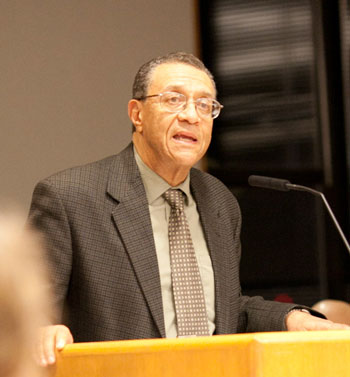
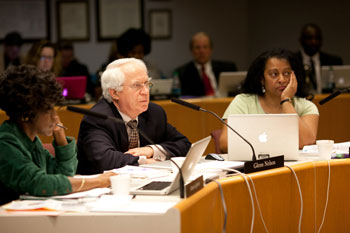
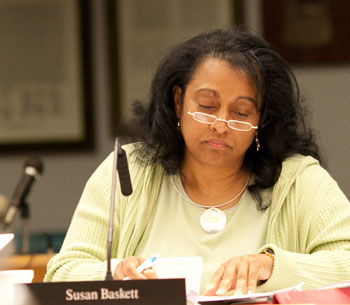
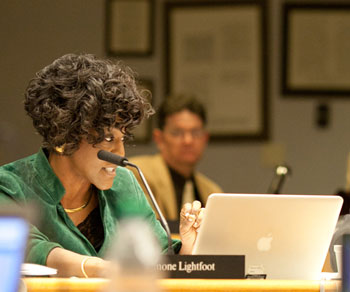
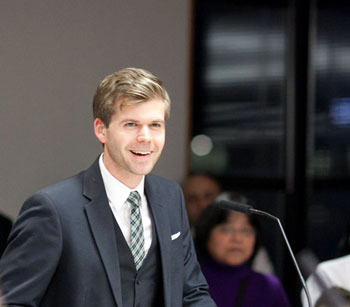
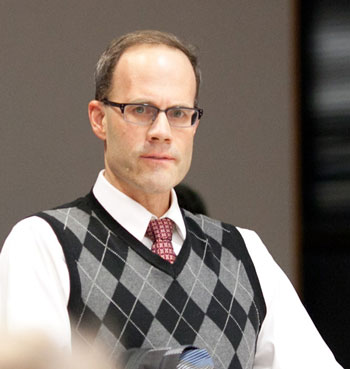

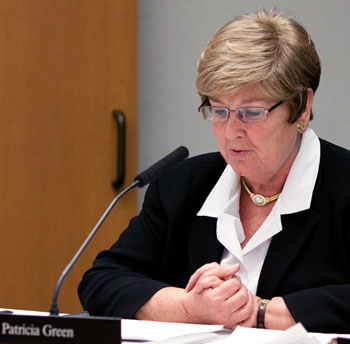
Thanks for the thorough report. It reads as though the AAPS intends to sole source the computer purchase to Apple.
Is this permissible under district purchasing guidelines? Most large entities require competitive bids from multiple vendors.
Possibly hundreds of thousands of dollars could be saved by looking at alternative solutions – especially since it appears that current software cannot be reused.
Regarding the Rising Scholars program–I understand the issues around equitable distribution of resources between schools, and I think that’s likely a problem with lots of other programs as well. I understand why Simone LIghtfoot is so frustrated by the achievement gap and feels that this is one of the only programs we have.
What I don’t understand is why Robyne Thompson calls this a “wonderful program” and why Pat Green is calling the program a “gem” when its success rate–as measured by the district’s own goals of students doing well in AP classes–is so poor. The ACT scores for African-American students in the program, while better than the district averages for African-American students, may have as much or more to do with who enrolls in the Rising Scholars program to begin with, than it does with anything that happens in the program. Is there any way of knowing?
The idea of engaging–not the talented tenth–but probably the top 1/3 of those who are seen to be underperforming–is a great idea. But evaluation is important. Based on measuring progress against goals, the Rising Scholars program is failing miserably across the board.
Over and over, I see that the school board and the district administrators start something as a “pilot” program, but then don’t evaluate the program and respond to the evaluation in a concrete way. Here we have a very complete evaluation, but it seems to go off the rails at the conclusion/next steps point.
Maybe there should be different goals. [What would they be?] Or maybe this program should be abandoned, as we try to cut millions of dollars from the school budget. Or maybe this program should be abandoned but the money should be directed to a different achievement gap program.
Two other examples, in fact, are in this school board report: NWEA Testing, and Trimesters. Both were proposed as pilot programs–but what kind of rigorous evaluation of them has there been?
[Side note: I did vote for the technology bond, but that was in spite of the NWEA testing, because I thought the district could use technology for some useful things...interactive learning. . . music composition. . . research and writing. Next time I would hope to see that the administrators are promoting new technology purchases for things that are useful in the classrooms.]
It is ok to abandon programs that aren’t working.